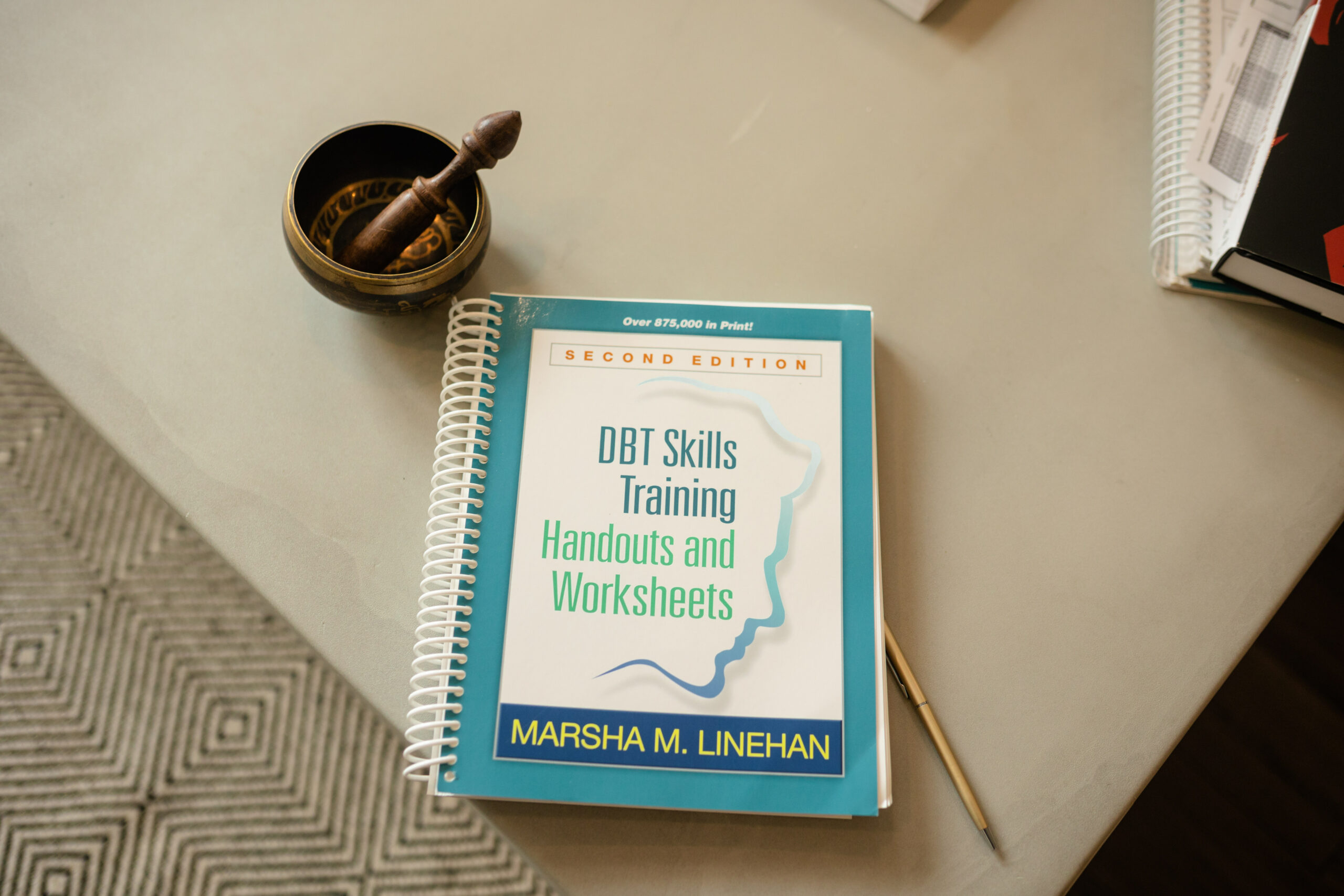“DBT didn’t work for me.”
More often than not, when we hear this from new clients, it’s because they actually, in fact, did not receive DBT. Many mental health providers are familiar with DBT skills or have attended a few workshops, but few have undergone the rigorous training and supervision to provide DBT as it was designed by the treatment developer, Dr. Marsha Linehan. DBT is a very time-intensive and often costly program, so it is important that clients are educated about what comprehensive DBT actually looks like. Included here are some guidelines to help you determine whether your current or prospective provider is actually offering comprehensive DBT.
Dialectical Behavior Therapy (DBT) consists of four components:
Weekly individual DBT therapy sessions

Clients attend weekly individual DBT sessions with a DBT-trained clinician and preferably a DBT-LBC™ certified clinician or a clinician within a DBT-LBC™ certified program. It is recommended that the individual therapist participates in a minimum of 40 DBT-specific hours of training from a reputable training provider (e.g., Behavioral Tech, DBT-LBC™). The structure of each individual session should be determined using a client’s recorded answers on a form called a “diary card,” which the client completes daily.
The highest standard in the assessment of DBT delivery is the DBT-Linehan Board of Certification™. To confirm certification of your DBT provider or program by the DBT-Linehan Board of Certification™, please visit the DBT-LBC website, https://dbt-lbc.org, then click consumers, and then click “Find a Certified Clinician” or “Find a Certified Program.” Of note, the Founder & CEO of Cincinnati Center for DBT, Dr. Nikki Winchester, is a DBT-Linehan Board of Certification, Certified Clinician™, and oversees the work of all DBT clinicians at Cincinnati Center for DBT.
Weekly DBT skills training group
 Clients attend weekly DBT skills training sessions which are usually conducted in a specialized group but are sometimes offered individually in a separate session focused solely on skills training. Adherent DBT skills training groups are typically 2-2.5 hours long, utilize Dr. Marsha Linehan’s DBT skills training manual, and are typically co-facilitated by two mental health professionals. Clients must make a minimum six-month commitment to DBT skills training, during which they learn the four core skills modules: mindfulness, interpersonal effectiveness, emotion regulation, and distress tolerance. Adherent DBT skills training requires that co-facilitators teach new material AND review assigned weekly homework in each session. Research indicates that outcomes for clients are best if they complete two full cycles of the program’s DBT skills training curriculum, though some clients only need one round of DBT skills.
Clients attend weekly DBT skills training sessions which are usually conducted in a specialized group but are sometimes offered individually in a separate session focused solely on skills training. Adherent DBT skills training groups are typically 2-2.5 hours long, utilize Dr. Marsha Linehan’s DBT skills training manual, and are typically co-facilitated by two mental health professionals. Clients must make a minimum six-month commitment to DBT skills training, during which they learn the four core skills modules: mindfulness, interpersonal effectiveness, emotion regulation, and distress tolerance. Adherent DBT skills training requires that co-facilitators teach new material AND review assigned weekly homework in each session. Research indicates that outcomes for clients are best if they complete two full cycles of the program’s DBT skills training curriculum, though some clients only need one round of DBT skills.
Click here to see the manual for adherent DBT skills training: DBT Skills Training Handouts and Worksheets, 2nd Edition, by Marsha Linehan
Click here to learn more about the types of skills covered in DBT: DBT Skills
 Between-session DBT phone coaching
Between-session DBT phone coaching
An adherent DBT therapist or program offers DBT phone coaching between sessions to help their clients use DBT skills in daily life and avoid higher levels of care. DBT phone coaching allows clients to get help using DBT skills before a crisis peaks. Clients also use DBT phone coaching to help them use DBT skills in their lives outside of therapy and to address relationship issues that come up with the therapist. Click this link to learn more about DBT phone coaching: What is DBT Phone Coaching?
 DBT therapist consultation team
DBT therapist consultation team
Adherent DBT requires that DBT therapists participate in a weekly DBT consultation team, where they meet with other DBT-trained therapists to support them in providing adherent DBT.
Without every one of the above components, it’s not DBT.
It is worth asking the following specific questions to any providers you are considering working with to make sure that they are actually providing comprehensive DBT (preferred answers are in parentheses):
- Are you or your program certified by DBT-LBC™? (Ideally yes, but if the clinician or program is not DBT-LBC™-certified, it will be even more important to inquire about their level of training and experience.)
- Do you provide DBT treatment? (Yes)
- What was your training for providing DBT? (Ideally, a minimum of 40 hours of didactic DBT training through a reputable training company or DBT-LBC™-certified clinician, as well as supervision by a DBT expert.)
- Do you provide both the individual therapy component of DBT and the skills component? (Ideally yes, however, sometimes clinicians will only provide one component of DBT. If this is the case, you will want to be sure that your clinician is willing to collaborate with the therapist(s) who will provide your individual DBT sessions or DBT skills training group.)
- If you provide DBT skills training, is the DBT skills training offered in a group setting, and how long does group last each week? (Preferably, the clinician co-leads a 2-2.5-hour weekly DBT skills training group with another clinician.)
- How long does your program take to complete one cycle of DBT skills training? (Adherent DBT programs are at least six months.)
- Do you allow a client/family to complete the DBT skills training curriculum two times? (An adherent DBT provider/program will answer yes.)
- Is continued participation in your DBT services based on some type of ongoing assessment of symptom improvement? (An adherent DBT provider/program will answer yes.)
- Do you provide DBT phone coaching between sessions as needed? Are there any limits placed on phone calls or between-session contacts? (An adherent DBT provider/program will provide DBT phone coaching and ideally has few limits or restrictions).
- Do you belong to a DBT consultation team that meets weekly and includes only other DBT-trained therapists? (This is required for adherent DBT.)
- Do you use a daily diary card? (This is required for adherent DBT.)
- What adaptations have you made to the research-supported methods of providing DBT? Why were those adaptations necessary? (Ideally, few, if any, adaptations have been made.)
Want to learn more about comprehensive DBT or DBT skills? Click here to learn more about comprehensive DBT. Click here to learn about the DBT skills training groups we offer at the Cincinnati Center for DBT. Click here to schedule an initial appointment with one of our amazing DBT therapists.
Credit for much of this information is attributed to the DBT-LBC™ legislative committee, Emotions Matter Inc. and their publication “Utilizing Single Case Agreements to Access Treatment for Borderline Personality Disorder: A Strategy to Support Health Care Consumers and Clinicians” (2017), and the DBT Metro Consortium.

